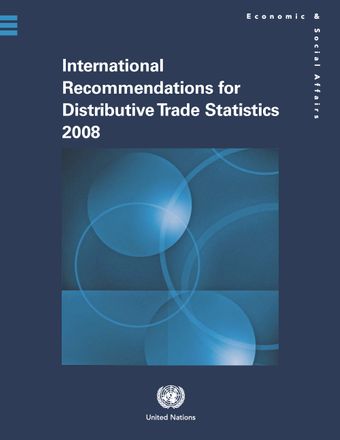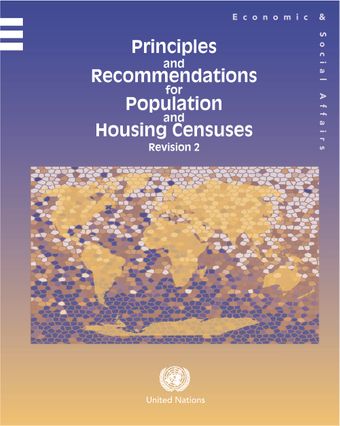- Home
- A-Z Publications
- Statistical Papers (Ser. M)
Statistical Papers (Ser. M)
Statistical Papers (Series M) is the title of a book series produced by the United Nations Statistics Division (UNSD), which is part of the United Nations Department of Economic and Social Affairs (DESA). This series includes various titles that deal with statistics gathering and methodology, among them: National Account Statistics, Directory of International Statistics, Guidelines on Principles of a System of Price and Quantity Statistics and more.
ISSN (online):
2412110X

International Recommendations for Energy Statistics
Sep 2018
Book
The International Recommendations for Energy Statistics (IRES) have been prepared by the United Nations Statistics Division in close cooperation with countries and other international/regional organizations and adopted by the United Nations Statistical Commission in February 2011. IRES was developed to assist countries in the establishment and strengthening of their energy statistical programmes. In particular IRES provides data compilers with a c Read More

Classification by Broad Economic Categories, Rev.5
Defined in Terms of the Harmonized Commodity Description and Coding System (2012) and the Central Product Classification, 2.1
Jun 2018
Book
Broad Economic Categories (BEC) aims to analyse international trade statistics by large economic classes of goods and services based on the main outputs of corresponding industries to facilitate broad analyses of trade and production. It can also be used to identify end-use dimensions (intermediate consumption gross fixed capital formation final consumption). It provides a new top level of broad economic categories based on the main outputs of correspon Read More

Framework for the Development of Environment Statistics 2013
Feb 2018
Book
This multi-purpose conceptual and statistical framework provides an organizing structure to guide the collection and compilation of environment statistics at the national level. Though recommended for use by countries at any stage of development its primary objective is to guide countries at early stages in the development of their environment statistics programmes by: (i) delineating the scope of environment statistics and identifying its constituents; (ii) Read More

Principles and Recommendations for Population and Housing Censuses, Revision 3
Nov 2017
Book
Since its early years the United Nations has issued a series of international recommendations on population and housing censuses under the title “Principles and Recommendations for Population and Housing Censuses”. These publication series which are based on good national practices in census taking are widely used by national statistical offices and census officials in countries throughout the world in planning and carrying out population and housin Read More

Manual on Statistics of International Trade in Services 2010 Compiler's Guide
Mar 2017
Book
The Guide provides practical support on the compilation of service transactions between residents—non-residents transactions utilizing the EBOPS classification with special emphasis on the partner country break-down the foreign affiliates statistics (FATS) and also on flows by modes of supply. The overarching aim is to increase the availability and quality of SITS in order to fulfil the urgent needs and demands for such data by policy makers re Read More

International Recommendations for Tourism Statistics 2008
Compilation Guide
Feb 2017
Book
International Recommendations for Tourism Statistics 2008 Compilation Guide is a companion document to the International Recommendations for Tourism Statistics (IRTS 2008). The primary purpose of this Compilation Guide is to provide further clarifications and practical guidance for using sources and methods to compile statistics on tourism. It is designed to support the production of a high quality set of basic data and indicators in each country and to str Read More

Handbook on Economic Tendency Surveys
Dec 2016
Book
The Handbook on Economic Tendency Surveys provides best practices and harmonized principles on how to conduct economic tendency survey from sample selection questionnaire design survey questions survey execution to data processing and dissemination. It also provides examples of uses of these surveys for example for composite tendency indicators. These surveys provide qualitative information that cannot be collected using other quantitative statisti Read More

Principles and Recommendations for a Vital Statistics System
Revision 3
Oct 2014
Book
The publication is an international standard on the design and operation of an efficient and accurate vital statistics system at national level. It provides guidelines on collection compiling and disseminating vital statistics. More specifically it contains (a) basic principles for a vital statistics system; (b) uses of vital statistics and civil registration records; (c) topics to be covered in a vital statistics system; (d) sources of vital statistics and how they function; (e) q Read More

International Recommendations for Distributive Trade Statistics 2008
May 2013
Book
The publication provides recommendations on the concepts definitions classifications data sources data compilation methods approaches to data quality assessment metadata and dissemination policies applicable in distributive trade statistics. The recommendations also cover some specific topics that have been identified as requiring additional guidance such as the treatment of informal sector units compilation of indices of distributive trade and seas Read More

International recommendations for industrial statistics 2008
Sep 2011
Book
The present publication is a component of the United Nations Statistics Division initiative for strengthening countries methodological and operational foundation for industrial statistics. Although this publication makes recommendations for industrial statistics many elements of its recommendations like those for the definition and delineation of statistical units and its guidance on a data-collection strategy and data compilation practices are generally app Read More

International Standard Industrial Classification of All Economic Activities (ISIC), Rev.4
Aug 2008
Book
The International Standard Industrial Classification of all Economic Activities (ISIC) is the international reference classification of productive economic activities. The publication's main purpose is to provide a set of activity categories that can be utilized for the production of statistics according to activity i.e. production and national income economic demographic and social statistics. This is an important tool for comparing statistical data on economic a Read More

Principles and recommendations for population and housing censuses
Jul 2008
Book
The population and housing census is part of an integrated national statistical system which may include other censuses (for example agriculture) surveys registers and administrative files. It provides at regular intervals the benchmark for population count at national and local levels. For small geographical areas or sub-populations it may represent the only source of information for certain social demographic and economic characteristics. For many countri Read More
No more items...
